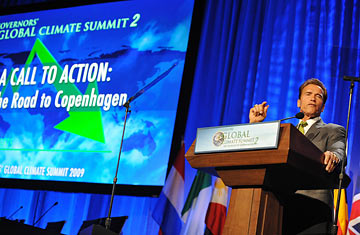
California Governor Arnold Schwarzenegger speaks at the second Governors' Global Climate Summit in Los Angeles.
Was it an omen when the power went out halfway through the Governors' Global Climate Summit? The 1,200 representatives from more than 70 states, provinces and countries in attendance at California Gov. Arnold Schwarzenegger's global warming conference were about to convene for panels on the green economy and clean-tech innovation, when the lights suddenly went dark at the Hyatt Regency Century Plaza Hotel in Los Angeles. There was a bit of confusion (given California's state budget woes, one had to wonder whether the power bill was past due), but soon enough the attendees shrugged and continued on with the conference. Having fought to put climate change on the global agenda for years — and now representing perhaps the world's best hope for confronting climate change — a brief blackout wasn't going to stop them.
This is the second time Schwarzenegger has held a global warming conference focused on what state and local governments can do about climate change, and it couldn't come at a more appropriate time. While Washington under President George W. Bush all but ignored climate change, California — with the Republican Schwarzenegger sometimes leading and sometimes following — embarked on its own green path, passing a landmark carbon-emissions cap for the state in 2006 and aggressively promoting renewable energy. Today, California's clean-tech sector is a rare bright spot in a state that is struggling with economic problems. California is where "technology met policy," said Terry Tamminen, the former secretary of the California Environmental Protection Agency and now a senior fellow for climate policy at the New America Foundation.
Due in no small part to prodding by California and other states with progressive governors, attitudes have changed in Washington. But Congress continues to dither over cap and trade, and California is moving ahead. On Sept. 15, Schwarzenegger signed an executive order requiring that the state get 33% of its electricity from renewable sources by 2020 — well above the 15% national standard that current climate bills circulating in Congress would require. California is not alone: more than half the states in the U.S. have similar renewable energy standards, and states in the West and the Northeast have begun to form regional carbon cap-and-trade programs. "This is an incredible opportunity to create the economies of the future and we must seize it," Schwarzenegger said in his opening speech at the summit on Sept. 30. "We are calling on our national governments to recognize the innovative solutions we have to offer."
The governors who have gathered in Los Angeles are pushing from the bottom up, demonstrating that there is political will to deal with climate change. Ultimately, of course, it will be the national governments in Washington, London and Beijing, among other places, that will take part in the upcoming U.N. climate summit in Copenhagen and shape how the world takes on global warming. But the vast majority of that response — whether it means shoring up cities for sea level rise or tightening green building codes — will need to be carried out at the state and city level, the governors in L.A. noted. The summit "is part of that global groundswell that perceives the threats from climate change, but also the inordinate opportunities if the world acts now and in concert to transit to a low carbon, green economy," said Achim Steiner, executive director for the U.N. Environment Program.
To that end, local governments are forging connections among themselves. A main focus of this year's Governors' summit is deforestation, another key issue in the run-up to Copenhagen. Eleven governors from states and provinces in Brazil, Indonesia, Canada and the U.S. issued a collective call for national governments to stop the loss of tropical forests, which accounts for up to one-fifth of global carbon emissions. On Friday, the last day of the summit, local leaders will sign agreements to work together on clean transportation and climate adaptation. With prospects for a complete treaty in Copenhagen diminishing — due largely to foot-dragging in Washington — what's needed now, as Schwarzenegger repeated at the summit, is "action, action, action." Even if it has to be done in the dark.
